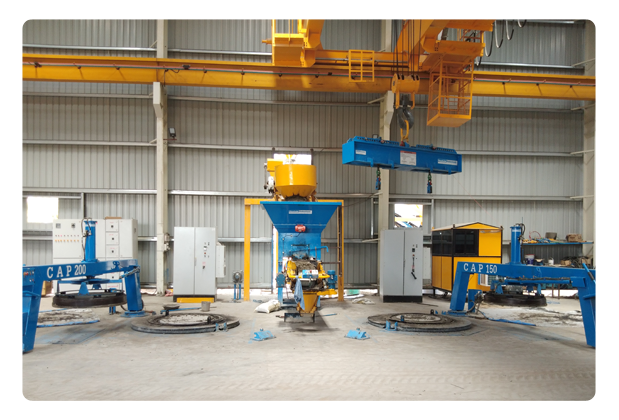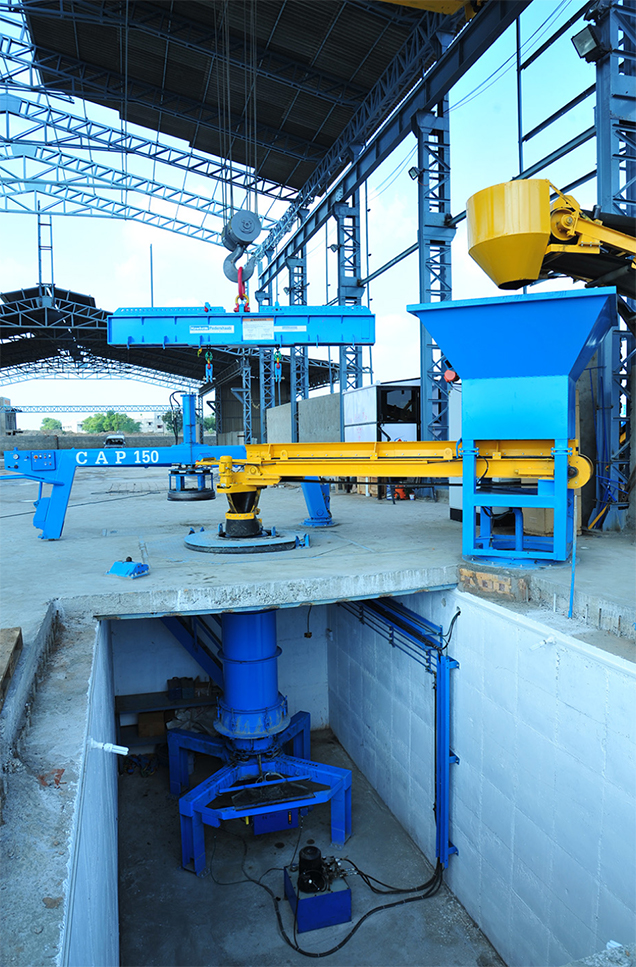
Concrete pipes are essential in infrastructure projects, from drainage systems to sewage networks. Ensuring that concrete pipe making machines and drycast moulds function efficiently is critical for consistent production quality and cost savings. Regular maintenance can extend equipment lifespan, reduce downtime and optimize performance.
This guide covers the best practices for maintaining pipe making machinery, including concrete pipe machines and drycast accessories, helping manufacturers improve efficiency and reduce unexpected repair costs.
The Importance of Regular Maintenance for Pipe Machines
Concrete pipe machinery operates under heavy loads and challenging conditions. Without proper upkeep, machines may suffer from wear and tear, leading to production inefficiencies.
Why Regular Maintenance Matters?
- Prevents Unexpected Breakdowns - Reduces downtime and avoids costly repairs.
- Improves Equipment Lifespan - Well-maintained machines last longer.
- Ensures Product Quality - Maintains precision in pipe dimensions and finish.
- Reduces Operational Costs - Lowers the need for expensive spare parts and emergency repairs.
By following a structured maintenance plan, concrete pipe machine operators can enhance productivity and minimize disruptions.
Routine Maintenance Tips for Concrete Pipe Making Machines
1. Conduct Regular Inspections of Pipe Machine
Frequent inspections help identify early signs of wear before they lead to major failures.
Key areas to check:
- Hydraulic systems - Ensure hoses, seals and valves are leak-free.
- Electrical components - Check wiring, sensors and control panels.
- Mechanical parts - Inspect belts, chains and bearings for wear.
- Lubrication levels - Maintain adequate lubrication to prevent friction damage.
A scheduled maintenance plan can improve operational efficiency and prevent costly downtimes.
2. Keep Lubrication Levels Optimal for Concrete Pipe Machine
Proper lubrication is crucial for reducing friction and overheating in concrete pipe machinery.
Best practices for lubrication:
- Use manufacturer-recommended lubricants for gears and bearings.
- Maintain a lubrication schedule to prevent dryness or over-lubrication.
- Regularly clean grease fittings to avoid contamination buildup.
Keeping all moving parts well-lubricated ensures smoother operation and extends equipment lifespan.
3. Maintain Clean Working Conditions Around the Pipe Making Machine
Dirt, dust and concrete residue can negatively impact pipe making machinery performance.
Cleaning tips:
- Remove concrete buildup from moulds and machine components.
- Keep hydraulic and pneumatic systems free from dust contamination.
- Use compressed air or vacuum systems to clean electrical panels safely.
Regular cleaning can prevent blockages and maintain production efficiency.
4. Monitor and Adjust Alignment of Concrete Pipe Machines
Misalignment in concrete pipe machines may lead to defective products and mechanical strain.
How to ensure proper alignment?
- Check conveyor belts and rollers for correct positioning.
- Align cutting and shaping tools to maintain precision.
- Ensure that moulds are placed accurately for uniform pipe formation.
Proper alignment improves product consistency and reduces material wastage.
Essential Maintenance for Drycast Moulds
1. Inspect Drycast Moulds for Cracks and Wear
Drycast moulds undergo high pressure during production. Even small defects can affect pipe quality.
Inspection tips:
- Look for cracks, deformations or corrosion in moulds.
- Check for loose fasteners that may impact mould stability.
- Replace worn-out drycast accessories to maintain uniform output.
Regular mould inspections ensure high-quality concrete pipes and prevent defects.
2. Proper Storage of Drycast Moulds
Improper storage may lead to rust and material degradation, affecting the durability.
Storage guidelines:
- Keep moulds in a dry, covered area when not in use.
- Apply protective coatings to prevent rust formation.
- Avoid stacking moulds improperly to prevent warping or damage.
A well-maintained drycast mould lasts longer and ensures consistent pipe production.

3. Apply Protective Coatings to Drycast Moulds
Protecting moulds from environmental exposure may extend their usability.
Recommended coatings:
- Anti-corrosion sprays for metal moulds.
- Release agents to prevent concrete adhesion.
- Heat-resistant coatings for high-temperature operations.
Regular application of protective coatings can reduce wear and tear, maintaining mould integrity.
Minimizing Maintenance Expenses for Concrete Pipe Machinery
1. Implement a Preventive Maintenance Schedule
A structured maintenance plan may help detect potential issues before they become major problems.
Steps to develop an effective schedule:
- Perform daily, weekly and monthly maintenance tasks.
- Keep records of maintenance activities for tracking performance.
- Train staff to follow best maintenance practices for concrete pipe making machines.
A preventive approach reduces sudden breakdowns and extends equipment lifespan.
2. Use Genuine Spare Parts for Repairs
Cheap or incompatible parts may lead to faster deterioration of concrete pipe machinery.
Why choose genuine parts?
- Ensures compatibility with existing machinery.
- Maintains manufacturer warranty conditions.
- Provides longer-lasting durability compared to generic alternatives.
Investing in high-quality parts may reduce long-term maintenance costs.
3. Train Operators to Handle Pipe Making Machinery Properly
Skilled operators can identify minor issues before they escalate.
Training benefits:
- Improves safety and reduces operator errors.
- Enhances productivity with proper machine handling.
- Encourages routine maintenance awareness.
Regular training sessions ensure that teams follow the best practices for equipment care.
Conclusion
Proper maintenance of concrete pipe making machines and drycast moulds is essential for consistent production and reduced downtime. By following structured inspection schedules, optimizing lubrication and using genuine parts, manufacturers can extend equipment lifespan while improving efficiency.
A well-maintained concrete pipe machine ensures high-quality pipe production, minimizes repair costs and maximizes operational performance. Implementing these best practices may lead to long-term savings and improved productivity in concrete pipe manufacturing.
FAQs - Concrete Pipe Making Machine
Routine maintenance should be conducted daily, with thorough inspections scheduled weekly and monthly.
Common issues include hydraulic leaks, worn-out moulds, misaligned conveyor belts and inadequate lubrication.
Store moulds in a dry environment, use protective coatings and apply anti-corrosion treatments regularly.
Misalignment may cause uneven pipes, increased material waste and mechanical strain on the machine.
Implement a preventive maintenance plan, use high-quality spare parts and train operators on proper machine handling.
Recent Articles
- Precast Concrete Box Culvert for Urban Underpasses and Cable Trenches
- How Concrete Pipe Machines Crucial in Power Plant Infrastructure?
- Role of Concrete Pipe Machines in Canal Lining Projects
- How Drycast Technology is Changing the Concrete Pipe Industry?
- Common Mistakes to Avoid When Selecting Pipe Moulds for Your Machine





 BACK TO ARTICLES
BACK TO ARTICLES